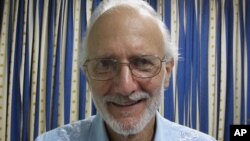U.S. Secretary of State John Kerry says Cuba's treatment of American Alan Gross "is inhumane and he is wrongfully imprisoned."
Kerry told U.S. senators Tuesday the United States has several efforts under way to free Gross, who was arrested in Cuba in 2009 and charged with illegally distributing communications equipment on the island. He was tried, convicted and sentenced to 15 years in prison.
Earlier, in testimony before another group of senators, U.S. Agency for International Development administrator Rajiv Shah said "the responsibility for [Gross'] detention rests with Cuban authorities.''
Gross was working as a subcontractor for USAID in Havana's Jewish community when he was arrested.
Also Tuesday, his attorney said Gross has begun a hunger strike in prison to object to what he says are "mistruths, deceptions, and inaction" by governments in Havana and Washington over his "arbitrary detention.
Gross has called for U.S. President Barack Obama to personally intercede on his behalf.
The case may be complicated by last week's Associated Press report that USAID had financed a social network in Cuba between 2010 and 2012. The AP says the aim of the so-called "Cuban Twitter" was to stir political unrest and undermine the Caribbean island's communist government.
The network, dubbed ZunZuneo, reportedly drew tens of thousands of subscribers who were unaware it was backed by the U.S. government.
In his Senate testimony, Shah said Gross's work and ZunZuneo were "absolutely not'' covert. He said creating platforms to improve communication in Cuba and elsewhere is a "core part" of what USAID does.
Shah took over USAID after the ZunZuneo project had ended.
Like USAID, Voice of America is funded by the United States government. Some VOA programming on health issues and entrepreneurship and some journalism training are funded by USAID. VOA maintains editorial control over those initiatives, and bases its news coverage solely on sound journalistic principles.
Kerry told U.S. senators Tuesday the United States has several efforts under way to free Gross, who was arrested in Cuba in 2009 and charged with illegally distributing communications equipment on the island. He was tried, convicted and sentenced to 15 years in prison.
Earlier, in testimony before another group of senators, U.S. Agency for International Development administrator Rajiv Shah said "the responsibility for [Gross'] detention rests with Cuban authorities.''
Gross was working as a subcontractor for USAID in Havana's Jewish community when he was arrested.
Also Tuesday, his attorney said Gross has begun a hunger strike in prison to object to what he says are "mistruths, deceptions, and inaction" by governments in Havana and Washington over his "arbitrary detention.
Gross has called for U.S. President Barack Obama to personally intercede on his behalf.
The case may be complicated by last week's Associated Press report that USAID had financed a social network in Cuba between 2010 and 2012. The AP says the aim of the so-called "Cuban Twitter" was to stir political unrest and undermine the Caribbean island's communist government.
The network, dubbed ZunZuneo, reportedly drew tens of thousands of subscribers who were unaware it was backed by the U.S. government.
In his Senate testimony, Shah said Gross's work and ZunZuneo were "absolutely not'' covert. He said creating platforms to improve communication in Cuba and elsewhere is a "core part" of what USAID does.
Shah took over USAID after the ZunZuneo project had ended.
Like USAID, Voice of America is funded by the United States government. Some VOA programming on health issues and entrepreneurship and some journalism training are funded by USAID. VOA maintains editorial control over those initiatives, and bases its news coverage solely on sound journalistic principles.












